We the Animals
Houghton Mifflin Harcourt, 2011
Interviewed by Diane Prokop
 Debut novelist Justin Torres was recently at Powell’s to read from his book We the Animals. It’s a portrait of the joys and heartbreaks of a young family made up of a white mother, a Puerto Rican father, and their three inseparable sons. O, the Oprah Magazine, says it is “so honest, poetic, and tough that it makes you reexamine what it means to love and to hurt.”
Debut novelist Justin Torres was recently at Powell’s to read from his book We the Animals. It’s a portrait of the joys and heartbreaks of a young family made up of a white mother, a Puerto Rican father, and their three inseparable sons. O, the Oprah Magazine, says it is “so honest, poetic, and tough that it makes you reexamine what it means to love and to hurt.”
PBR: How much of the story is true?
Justin: The hard facts mirror my own biography. I have two brothers, my mother worked in a brewery, my parents were teenagers when they started having kids, but I really did make up a family. I was making myth out of family, so the characters are not my family members. The incidents are all made up. I have a very kind of blurry memory of my childhood. I could never remember anything as specific as what’s in this book. The chapters are trying to get at an emotional truth that is resonant with me and my own experience, but I get there by invention.
PBR: Your book is very lyrical like poetry and almost dreamlike with little snippets of images. How did you come up with that style?
Justin: When I started writing, I didn’t make distinctions between poetry, fiction and memoir in my mind. I felt free to take things from my personal experience and get extremely poetic. I felt free to make things up.
PBR: What was your writing process for this book?
Justin: I was just writing and writing and eventually I had a critical mass. I started to see little pieces as wholes and so sent them out. I got really good reception and really good support. I had this amazing teacher in New York and that’s when I slowly started thinking – oh, I guess I’m writing a book. But, it really wasn’t until I got to Iowa (Iowa Writers’ Workshop) that I realized that this was a novel. When I got to Iowa, I had this moment when I wrote a second narrative to weave through this one, because I thought well, I’m writing a novel, it has to be big and filled out, and all of what’s unsaid needs to be filled in. But it was terrible. Nobody will ever see it. So, I just returned to my gut instinct which was that I want this book to be fragmented. I wanted it in short bursts. I wanted it to mimic the way that memory functions as much as possible.
PBR: Can you talk about the animal imagery and metaphor in your novel?
Justin: It partly refers to the way the family is looked at from the outside world. It can be very pejorative. You know, like these people are animals – there’s violence and passion and everybody’s kind of running wild. The kids are being raised without a lot of guidance and supervision, so they’re kind of going feral. I’m hopeful as you get to the end of the book, you resist the title and that the characters have been humanized.
PBR: Even though this book is fiction, did you find that writing it was cathartic or did it change you in any way?
Justin: It’s interesting. I think that at times writing can be cathartic and writing from personal experience can be the most painful and grueling thing ever. You have to sit down and examine things you’d rather not. You have to be really honest. Understanding the motives of my characters forced me to be a more compassionate and open-minded person. So now, when I see someone on the street or someone opens a door for me, I wonder, ‘what are the circumstances of their life that brought them to be this kind of person’. Whether people are treating each other badly or whether they’re treating each other well, I think that I am less judgmental. That’s something that writing this book forced upon me and I’m grateful for it.
PBR: Do you feel like an outsider?
Justin: I do. I feel outside and inside. I’m mixed race – bi-racial. My parents are from different cultures. My father spoke Spanish as his first language. I grew up in a really white town but we would go to Brooklyn to see our family constantly so I never really felt accepted in either place. In the town I grew up in, we stuck out. There’s that, and then I’m queer and I was raised to be straight, so I feel like I have access to the insider’s world, but I also feel apart and separate from that. Also, I grew up working class and now I’m at Stanford. So, I feel like I have a foot in a lot of worlds, but I feel like an outsider in all of them. It’s a great place to be as an author.
PBR: What did your parents give you that informs your writing?
Justin: My parents are amazing storytellers. They always had a narrative for everything. They’re big talkers and passionate people. They’re both kind of bullshit artists – in the best way though. That’s something that I got from them as well. My mother can talk anybody into anything. The same is true for my father. So, I didn’t grow up in a literary home, but I grew up in a house of words, for sure. They are total scrappers. They were kids and they didn’t have financial support from their families. They moved to this small town in upstate New York on their own. Eventually, they got their G.E.D.s, then they went to college. My mother now has a master’s and my father is a state trooper. They have perseverance.
PBR: What would you like your readers to take away from We the Animals?
Justin: I think that there is a lot of love and grace and beauty in this family and a lot of families. I’ve talked to people who haven’t had the smoothest childhoods who have read the book, and they’ve said that certain hardened resentments that they had were softened. That, to me, is the most wonderful thing. There are some things that I won’t ever get over, but I forgive, I forgive. I think it’s really important to challenge where you’ve become hard and fast, and where you’re not being as generous as you could and not really looking at it from all sides.
PBR: How has having your book published affected you?
Justin: It’s been wonderful. I have had a dream reception with this book. There’s been a lot positive things that have come my way. I’ve met so many people that feel passionate about it, and it’s all so wonderful. But, I feel like all of that comes with a lot of expectations, as well, and that kind of terrifies me. I think that there’s a certain responsibility to being a writer beyond just sitting in a room typing, but also to be a good citizen of this world, to be a voice for people.
PBR: What are you writing now?
Justin: I’m working on the next book. I’m still drawing from personal experience. I have the wild years! I don’t have much time to write now, but I’m whittling away on it.
 Justin Torres is a Wallace Stegner Fellow at Stanford. His work has appeared in The New Yorker, Granta, Tin House and Glimmer Train. He is a graduate of the Iowa Writers’ Workshop and was the recipient of a Rolón Fellowship in Literature from United States Artists. His story, Starve a Rat, appears in the October issue of Harper’s Magazine.
Justin Torres is a Wallace Stegner Fellow at Stanford. His work has appeared in The New Yorker, Granta, Tin House and Glimmer Train. He is a graduate of the Iowa Writers’ Workshop and was the recipient of a Rolón Fellowship in Literature from United States Artists. His story, Starve a Rat, appears in the October issue of Harper’s Magazine.

